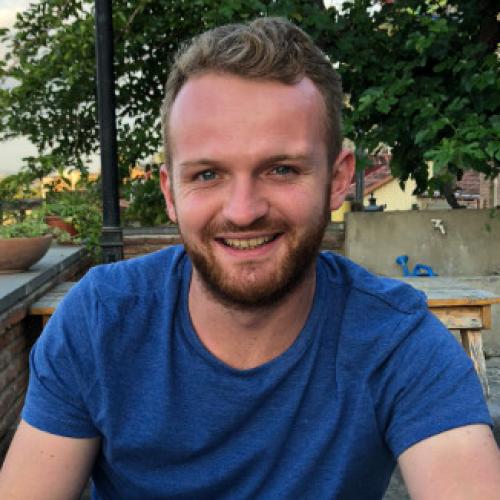-
Tuesday, 18 Nov, 2025Pre-Event WorkshopParticipation is limited to invited or approved attendees only.
Trusted Data, Deeper Insights: QIAGEN’s Blueprint for Drug Discovery Success
Kickstart your AIDDD experience with our pre-event workshops, designed to provide in-depth insights and hands-on learning in key areas of the industry. Join QIAGEN for a deep-dive workshop exploring its AI-powered biomedical knowledge base, designed to accelerate target identification, pathway analysis, and data-driven drug discovery through advanced omics integration.
Sponsor(s):QiagenSummary:This is an exclusive workshop session. Participation is limited to invited or approved attendees only.Session Type:General Session (Presentation)Blueprint for Drug Discovery Continuum Success
Speaker(s):
Venkatesh Moktali, PhD
Director, Product Management, Knowledge BasesQIAGEN Digital InsightsTime:2:30 PM – 2:50 PMSession Type:KeynoteIntelligent Discovery at Scale: Building Biomedical Knowledge Graphs for the GenAI Era
Speaker(s):
Katie Roberts, PhD
Data Science Solution ArchitectNeo4jTime:2:50 PM - 3:20 PMSession Type:General Session (Presentation)Knowledge Graphs as the Backbone of AI-Driven Drug Discovery
Speaker(s):
Eric Kehoe
PhD Senior Principal Scientist, Automation & Data SciencesZoetisTime:3:20 PM - 3:50 PMSession Type:General Session (Presentation)Expert Panel Discussion
Speaker(s):Moderator
Joseph Pearson
Director, Global Product Management OmicSoftQIAGEN Digital Insights
Nicholas Geraci
Senior ScientistEMD Serono
Carl Latham
VP Sales & PartnershipsOntoforce
Eric Kehoe
PhD Senior Principal Scientist, Automation & Data SciencesZoetisTime:3:50 PM – 4:30 PMSession Type:PanelDrinks Reception
Time:4:30 – 5:30 PMSession Type:General Session (Presentation) -
Wednesday, 19 Nov, 2025
Registration
Time:8:00 AM - 8:45 AMSession Type:RegistrationMorning Panels & PresentationsWelcome & Chair's Opening Remarks
Speaker(s):
Sagar Jain
Director, Digital AI Strategy SSFRocheTime:8:45 AM - 9:00 AMSession Type:General Session (Presentation)Executive Panel: Recent Advances and Future Perspectives for AI in the Drug Discovery and Development Value Chain
Sponsor(s):MilliporeSigmaSpeaker(s):Moderator
David Champagne
Senior PartnerMcKinsey & CompanyDavid Champagne is a Senior Partner at McKinsey and leads McKinsey’s global Scientific AI practice to help clients in the life sciences industry and beyond drive the next frontier of R&D productivity with AI. The practice covers a broad range of AI capabilities across Biology, Chemistry, Materials and Physics. David brings together teams of scientific experts from McKinsey’s industry practices with deep technology expertise from QuantumBlack, to develop strategies, blueprints and roadmaps for the technology-driven transformation of product discovery and development processes in industries where science is at the core of innovation.

Melissa Landon
Head, Commercial & Business Development, AI & AutomationMilliporeSigmaDr. Melissa (“Mel”) Landon leads Commercial and Business Development for AI and Automation at Millipore Sigma, the Life Science business of Merck KGaA. With 20 years of experience of building cutting edge platforms across pharma and tech, Mel’s current work focuses on scaling intelligent automation and AI solutions that bridge scientific innovation with commercial value. She brings to this role a cross-disciplinary background spanning life sciences, technology partnerships, and enterprise transformation. Prior to joining MilliporeSigma, Melissa served as Chief Strategy Officer at Cyclica, an AI-enabled tech bio company (acquired by Recursion in 2023). Melissa completed her PhD in Bioinformatics at Boston University and performed postdoctoral studies in biochemistry and X-ray crystallography at Brandeis University.

David Hallett
Chief Scientific OfficerRecursion
Morten Sogaard
Senior Vice President & Head, Astellas Innovation LabAstellas PharmaTime:9:00 AM - 9:45 AMSession Type:PanelClosing the Knowledge Loop in AI-Powered R&D
Next-generation AI is transforming research and development by enabling:
- Scalable insights from multi-modal datasets
- In silico experimentation powered by machine learning and foundation models
- Generative AI for novel molecule design
- Automated workflows through agentic systems and robotics
These innovations are already accelerating speed and reducing cost in R&D. But beyond efficiency, AI presents a deeper opportunity: advancing scientific understanding of diseases and drugs. By keeping human scientists actively in the loop, AI can provide oversight, foster discovery, and open entirely new therapeutic avenues.
In this session, we will explore how modern AI tools can “close the knowledge loop”—moving from automation and efficiency toward true scientific insight and discovery.
Sponsor(s):McKinsey & CompanySpeaker(s):
Chris Anagnostopoulos
Tech Fellow PartnerMcKinsey & CompanyChris Anagnostopoulos is a Technology Fellow Partner at McKinsey, and leads McKinsey/QuantumBlack’s work in Scientific AI. He is a responsible for methodological innovation and solution design, and acts as a catalyst for the adoption of state-of-the-art AI solutions for biopharma R&D. Prior to joining McKinsey/QuantumBlack, he was Founder and CEO of an AI consultancy, and Director of R&D in a 100+ London-based tech company building programming languages for AI. He holds an MSc in AI and a PhD in Statistical Machine Learning, is a Chartered Statistician with the Royal Statistical Society and an Honorary Associate Professor at Imperial College London.
Time:9:45 AM - 10:15 AMSession Type:General Session (Presentation)Investment Trends in AI Across the Drug Discovery and Development Landscape
Speaker(s):
Mark Adams
PartnerTwo Bear CapitalTime:10:15 AM - 10:45 AMSession Type:General Session (Presentation)Morning Break & Technical Insights SessionsNetworking
Time:10:45am - 11:45amSession Type:General Session (Presentation)Technical Insights Session 1: Human-in-the-Loop Agent Workflows with bfPREP™
AI agents look magical in demos and messy in production. This talk distills how we operationalize AI agents for day-to-day analytics. We cover schema discovery for stable interfaces, structured outputs for evaluation, human-in-the-loop gates for quality, and intentional context hooks for reproducibility. In 10 minutes I will show the shapes that work, the failure modes that recur, and the smallest set of practices that make our agents dependable for data science.
Sponsor(s):Bullfrog AISpeaker(s):
Juan Felipe Beltran
Associate Director AI/Machine LearningBullFrog AITime:10:50AM - 11:00AMSession Type:General Session (Presentation)Technical Insights Session 2: Adding dynamics to structural drug design
Drug-target interactions occur on second-to-minute timescales, but computational methods only reach microseconds. AI is still grappling with static protein structures. This gap hides the transition states that control drug kinetics, forcing trial-and-error optimization. Enhanced sampling methods for atomistic simulations can bridge this timescale gap, achieving 10,000-fold acceleration while maintaining physical accuracy. Applied to multiple drug discovery programs, we reveal previously invisible transition states that enabled rational optimization of drug residence time and selectivity.
Sponsor(s):Examol CorporationSpeaker(s):
Dennis Nenno
Chief Executive OfficerExamolDennis Nenno is a founder and the Chief Executive Officer of Examol, an operating system for computational drug discovery focused on small molecules. He led project teams at BASF, developing software solutions to automate chemical plants worldwide. As a research fellow, he simulated the properties of advanced and unrealized materials at Harvard University and the Max Planck Institute for Chemical Physics of Solids. He holds a Ph.D. in Theoretical Physics. Dennis is an advisor on quantum technologies for venture capital.
Time:11:05AM - 11:15AMSession Type:General Session (Presentation)Technical Insights Session 3: Salt AI Platform Demo: Contextual AI-enabled protein design for oncology targets
- The future requires systems that connect data, models, and tools
- Salt AI platform enables companies to deploy, build, optimize, and run multi-model systems
- Proven impact in drug discovery with complex protein design pipeline
Sponsor(s):Salt AISpeaker(s):
Dan Sheikh
VP, AI SolutionsSalt AIDan Sheikh is a technology strategist and AI innovator specializing in applying artificial intelligence and data science in regulated industries. With advanced degrees from University College London and the UCLA Anderson School of Management, he bridges deep technical expertise with strategic insight to design AI solutions that are powerful, compliant, and scalable. His work focuses on driving responsible digital transformation that aligns innovation with operational value and regulatory integrity.

Toby Sayre
VP, Business DevelopmentSalt AIToby Sayre is a commercial leader with a background in life sciences and biotechnology consulting, business development, and product strategy. He holds master’s degrees in Cell and Molecular Biology and Biochemistry from San Francisco State University and UCLA. His work bridges bioinformatics, real-world data, and AI-driven software, integrating technical and commercial expertise to advance innovation in the life sciences.
Time:11:20AM - 11:30AMSession Type:General Session (Presentation)Technical Insights Session 4: Turning Bio Foundation Models into Virtual Discovery Labs
How Pharma Teams Operationalize OMICS Foundation Models in Early Discovery
Sponsor(s):HelicalSpeaker(s):
Rick Schneider
CEOHelicalTime:11:35AM - 11:45amSession Type:General Session (Presentation)Morning SessionsAI-Driven Insights: Unlocking New Therapeutic Concepts and Decoding Complex Disease Biology
• Explore how AI models decode complex disease biology by identifying pathological features, mapping dysregulated pathways, and pinpointing high-confidence drug targets at a systems level.
• Learn how foundational and generative models accelerate de novo therapeutic discovery by predicting target–disease associations and streamlining early development decisions.Sponsor(s):BenchiSciSpeaker(s):
Casandra Mangroo
SVP, Strategic AlliancesBenchSci
Ari Allyn-Feuer
Director, AI Intelligence ProductGSK
Arvind Rao
Professor, Computational Medicine & BioinformaticsUniversity of MichiganTime:11:45 AM - 12:15 PMAgenda Track No.:Track 1Session Type:General Session (Presentation)Integrating GenAI for Small Molecule Generation and Optimization
- Learn how GenAI is transforming early drug discovery by designing novel, drug-like small molecules with improved potency, selectivity, and ADME properties.
- Explore how GenAI integrates with synthesis planning and automation tools to prioritize viable candidates and accelerate iterative drug development.
Sponsor(s):QC WareSpeaker(s):Moderator
Jason Shields
Associate Principal ScientistAstraZeneca
Christopher D. Taylor
Director of Applied SciencesPromethium (QC Ware Corp.)Christopher D. Taylor is Director of Applied Sciences at Promethium (QC Ware Corp.), bringing over 25 years of expertise in density functional theory (DFT). He works with drug discovery teams to bridge AI and quantum chemistry, guiding the deployment of DFT-based rational drug design and descriptor-driven frameworks for drug discovery. Throughout his career, Christopher has used DFT to solve problems once considered unsolvable, and he now highlights how high-quality quantum mechanical data, when used to train AI models, delivers significant gains in accuracy and insight. By translating complex scientific challenges into scalable workflows, he helps accelerate both small molecule and macromolecule design with quantum-level precision.

Philip Tagari
Chief Scientific OfficerInsitro
Yue-Wang Webster
Vice President, Model Driven Drug Discovery PlatformsEli LillyTime:11:45 AM - 12:15 PMAgenda Track No.:Track 2Session Type:General Session (Presentation)Improving Data Quality and Tackling Model Bias with Robust, Well-Curated Data
- Explore practical strategies for building high-quality, diverse datasets that reduce bias and improve model performance across drug discovery pipelines.
Speaker(s):
Nevin Gerek Ince
Director, Data & Solutions EngineeringNovo NordiskTime:11:45 AM - 12:15 PMAgenda Track No.:Track 3Session Type:General Session (Presentation)Innovation Trends in AI Enabled Clinical Trials
- Learn how predictive simulations, generative AI and differentiating clinical biomarkers are forecasted to cut prototyping timelines by weeks and reduce per‑trial costs.
Speaker(s):
Sandeep Burugupalli
Head of Data Science, BioPharmaceuticals R&DAstraZeneca
V. Tyrone Lam
Chief Business OfficerGATC Health
Daisuke Goto
Director, Medical Affairs & Outcomes ResearchOrganonTime:11:45 AM - 12:15 PMAgenda Track No.:Track 4Session Type:General Session (Presentation)Unlocking Process Intelligence with Real-Time Monitoring and Control
- Explore how ML-enabled real-time control systems and continuous process verification improve yield predictability, reduce rework, and enable faster release - offering a direct line of sight to cost savings and product quality gains.
Speaker(s):
Preeya Boppana
Director of MS&T AnalyticsAstraZenecaTime:11:45 AM - 12:15 PMAgenda Track No.:Track 5Session Type:General Session (Presentation)Afternoon SessionsMoving from Co-Pilot to Autopilot in Biopharma R&D: Democratizing Research Tools and Lab Data With Agents
Today, we present Helix AI, a novel AI-powered discovery engine that integrates generative chemistry, multi-omics insights, and predictive analytics into one unified platform.Acting as an agentic experiment designer, Helix AI combines hundreds of tools and datasets, rapidly generating, prioritizing, and optimizing workflows from target ID to IND. With adaptive learning and scientist-in-the-loop control, it helps R&D organizations accelerating discovery timelines from years to weeks while facilitating the discovery of novel therapeutic candidates across modalities. Helix AI represents an inflection point in how AI can drive value in R&D programs.Join us to learn more about how it is changing drug discovery research for the better.
Sponsor(s):Helix AISpeaker(s):
Marcos Camara Donoso
Director, AI SolutionsHelixAI
Steve Gately
Client Director, Healthcare ISV PlatformsNVIDIASteve leads NVIDIA’s engagement with strategic ISV platform partners in the healthcare sector, helping them accelerate their go-to-market initiatives. By integrating partners’ specialized tools and data with NVIDIA’s advanced training and inference technologies, Steve and his team develop cohesive strategies that drive success across key AI-powered healthcare use cases.
Time:12:15 PM - 12:45 PMAgenda Track No.:Track 1Session Type:General Session (Presentation)Navigating the Frontier of Advanced Computing
Advanced computing is a strategic imperative for pharmaceutical innovation. The industry is at a point where traditional computational methods are no longer sufficient to solve the increasingly complex problems in R&D and operations. Embracing technologies like quantum computing and HPC is critical for maintaining a competitive edge and driving breakthroughs.
A hybrid approach is essential for a complete solution. No single technology is the silver bullet. The most effective solutions come from using the right tools—be it classical, quantum, or quantum-inspired—and combining them into a single, powerful workflow to maximize efficiency and impact. This approach allows companies to apply the best technology to a wide range of problems across the business, not just in drug discovery.
Strategic partnerships are key to capability building. For a large enterprise like J&J, the path to adopting these advanced technologies is best navigated through collaboration. Working with a specialist like Strangeworks bridges the knowledge gap, provides access to powerful platforms, and helps overcome organizational hurdles. The ultimate goal of this collaborations like these is to be able to empower J&J's internal teams to become self-sufficient pioneers of innovation.
Sponsor(s):StrangeworksSpeaker(s):
Steve Gibson
Chief Commercial OfficerStrangeworksSteve has held a range of C-Suite positions in technology companies ranging from financial technology services, to data science consulting. Currently he serves as Chief Commercial Officer at Strangeworks; an advanced compute platform as a service (PaaS) company based in Austin, Texas. Prior to Strangeworks, Steve helped build several startups from the ground up, the most successful being Honest Dollar which was the first startup acquired by Goldman Sachs in their 147 year history. Prior to Honest Dollar, Steve worked for a number of large multinational corporations in the European aerospace sector delivering platforms for military, civil and space applications. Steve holds a Bachelor’s degree in Aerospace Systems Engineering from the University of Coventry in the UK.

Selene Sass
Technology Product ManagerJohnson and JohnsonSelene is a technology product manager at Johnson & Johnson with nearly five years supporting the Advanced Computing and Analytics team. Her primary focus is to empower R&D scientists with emerging and innovative technologies in the advanced computing space, including the integration of quantum computing within J&J. Currently, she supports groups working in AI/ML and is exploring how quantum computing techniques can further enhance these capabilities.
Time:12:15 PM - 12:45 PMAgenda Track No.:Track 2Session Type:General Session (Presentation)Hybrid AI Infrastructure for Data Analytics and Drug Discovery
This session explores how hybrid AI infrastructure is transforming drug discovery by integrating on-premises, private cloud, and public cloud resources for optimal data control, computational power, scalability, and security. Attendees will learn how pharmaceutical organizations use cutting-edge AI and machine learning tools for target identification and molecular design, while maintaining compliance with strict regulatory standards. The presentation will cover the architecture and core components of hybrid infrastructure, including high-performance computing, data management, MLOps, and compliance frameworks. Key benefits such as accelerated R&D, cost reduction, improved collaboration, and flexible scalability will be discussed, alongside real-world case studies. The session will also address challenges like data integration, interoperability, regulatory complexity, and AI interpretability, offering practical strategies to overcome these obstacles.
Sponsor(s):HPESpeaker(s):
Alex Madama
Distinguished TechnologistHewlett Packard EnterpriseAlex Madama is a Distinguished Technologist at Hewlett Packard Enterprise, specializing in strategic technology integration for life sciences organizations, including healthcare, pharmaceutical, biotech, and medical device companies. He leads initiatives combining high-performance computing, Hybrid Cloud, IoT, big data, and AI to advance drug discovery, pharmaceutical R&D, and biologics manufacturing, aiming to optimize patient outcomes and reduce costs. Before re-joining HPE, Alex served as Vice President of Product at UnitedHealth Group R&D, where he drove innovation in healthcare research and development. He holds a bachelor’s degree in life science and a Doctor of Osteopathic Medicine from New York Institute of Technology, with additional clinical training at Good Samaritan Hospital Medical Center, and lectures as an Adjunct Professor of Health Information Technology at Hofstra University. Previously, Alex founded Onyx CCS and held leadership roles at Nook.com, Barnes & Noble, AIG, Cravath Swaine & Moore, and as founder of seekPhysician.com.
Time:12:15 PM - 12:45 PMAgenda Track No.:Track 3Session Type:General Session (Presentation)Transforming Clinical Trials: How AI is Accelerating the Journey from Molecule to Medicine
Review how decision intelligence is transforming the way organisations plan and execute complex projects. Apply decision intelligence to high-stakes environments such as clinical trials and learn how AI can dramatically reduce trial-planning timelines, optimise trial execution, and improve portfolio-level decision-making. Explore how leading enterprises are using Decision Intelligence platform to bring greater clarity, speed, and confidence to their most critical operational and strategic decisions.
Sponsor(s):FacultySpeaker(s):
Andrew Brookes
Chief Technical Officer & Co-FounderFacultyAndrew leads Faculty’s technical teams and developed the backbone of Faculty’s AI operating system, Frontier. His accomplishments span building the NHS Covid Early Warning System and mission critical projects for the UK Ministry of Defence. Before Faculty, Andrew led an engineering team at investment management firm BlackRock. He holds a Master’s degree in Computer Science from the University of Warwick.
Time:12:15 PM - 12:45 PMAgenda Track No.:Track 4Session Type:General Session (Presentation)Breaking the Boundaries: Unlocking the Full Potential of Digital Process Development
Data powers the engine of artificial intelligence (AI), but not all data is created equal. While software capabilities are rapidly accelerating, the biopharma industry still largely lacks the intelligent hardware needed to generate clean, contextualized, and high-quality data that AI and machine learning (ML) models require to deliver on their promise.
Explore how today’s in silico process development tools for bioreactor scaling and mechanistic modeling of chromatography can help you get it right the first time now, and why the next generation of intelligent hardware will be critical to unlocking the full potential of AI/ML in biopharma.
Sponsor(s):CytivaSpeaker(s):
Tobias Hahn, PhD
R&D Director, GoSilicoCytivaTobias Hahn is R&D Director of chromatography mechanistic modeling activities at Cytiva. As former co-founder and CEO of GoSilico, now part of Cytiva, Tobias is responsible for delivering simulation software and workflows for in silico process development. He received his undergraduate education in computational mathematics and technical physics in Karlsruhe and Stockholm, earning his PhD in chemical engineering from Karlsruhe Institute of Technology (KIT). During his doctoral studies, he utilized his background in mathematics and software engineering to create the simulation software now known as GoSilico™ chromatography modeling software.

Cilon Li
Sr. Director of Engineering, Digital Products DevelopmentCytivaCilon Li is a digital and IT executive with over 15 years of experience in healthcare and biopharma. He is a strategic leader with a proven track record in driving digital transformation across supply chain management, product management, and R&D. At Cytiva, Cilon drives the company’s digital strategy and expanding product portfolio, encompassing Internet of Things (IoT), data analytics, AI/ML, software as a service (SaaS) and enterprise applications to help customers progress their digital biomanufacturing journeys.
Time:12:15 PM - 12:45 PMAgenda Track No.:Track 5Session Type:General Session (Presentation)AI and Multiomics Integration for Enhanced Target Identification and Validation
- Learn how AI-driven approaches integrate multiomics data, including genomics, proteomics, and transcriptomics, to identify potential drug targets and disease biomarkers for complex diseases.
- Explore how AI models synthesize cross-omic data and real-time multiomic information to uncover novel biological mechanisms, identify potential biomarkers and enable precision medicine.
Sponsor(s):Solix TechnologiesSpeaker(s):Moderator
Raju Pusapati
Vice President, Life SciencesSolix Technologies Inc.Dr. Raju Pusapati is a biologist and drug discovery scientist with a distinguished 15+ year career spanning top-tier institutions like Genentech, Exelixis, and emerging biotech ventures. Trained at Harvard and Genentech, his expertise lies in translating basic cancer biology—including the discovery of novel signaling pathways and resistance mechanisms—into viable clinical candidates.
As a project leader and biology lead, he has a proven track record of steering oncology programs from target validation and lead identification through to Go/No-Go decisions, with publications in top-tier journals such as Cancer Cell and Nature Chemical Biology. His hands-on experience encompasses the full spectrum of pre-clinical work, including biomarker strategy, PK/PD, and managing complex internal and external collaborations.
In his current role as Vice President of Life Sciences at Solix Technologies, Dr. Pusapati leverages this deep industry background to bridge the gap between biology and technology. He leads the charge in adopting Solix's CDP and Enterprise AI platforms, empowering life sciences companies to unlock data-driven insights and accelerate therapeutic innovation. He brings this unique, dual perspective to the panel “AI and Multi-omics Integration for Enhanced Target Identification and Validation".

Kiran Nistala
Head, Functional GenomicsAlkermes
Harris Bell-Temin
Director, ProteomicsJohnson & Johnson Innovative Medicine
Arthur Liberzon
Director, AI Research Lead for Omics, Oncology Data ScienceAstraZenecaTime:12:45 PM - 1:15 PMAgenda Track No.:Track 1Session Type:General Session (Presentation)AI-Powered Drug Discovery: Using Machine Learning to Predict Molecular Interactions
- Explore how AI models predict protein 3D structures from sequences, enabling insights into folding pathways and functional conformations
- Examine foundational models that reveal protein–protein interactions and guide design of innovative drug candidates
Speaker(s):
Miles Congreve
Chief Scientific OfficerIsomorphic LabsTime:12:45 PM - 1:15 PMAgenda Track No.:Track 2Session Type:General Session (Presentation)Building an Integrated AI Platform for Accelerating Drug Discovery
Speaker(s):
Max Liu
Senior Software Engineer - Early ScienceAstraZenecaTime:12:45 PM - 1:15 PMAgenda Track No.:Track 3Session Type:General Session (Presentation)Turning Data into Actions: Accelerating Decision-making, Streamlining Operations, and Improving Patient Outcomes
Speaker(s):
Subha Madhavan
Vice President & Head of Clinical AI / MLPfizerTime:12:45 PM - 1:15 PMAgenda Track No.:Track 4Session Type:General Session (Presentation)Autonomous Drug Discovery: How Do We Get There?
Speaker(s):
Melissa Landon
Head, Commercial & Business Development, AI & AutomationMilliporeSigmaDr. Melissa (“Mel”) Landon leads Commercial and Business Development for AI and Automation at Millipore Sigma, the Life Science business of Merck KGaA. With 20 years of experience of building cutting edge platforms across pharma and tech, Mel’s current work focuses on scaling intelligent automation and AI solutions that bridge scientific innovation with commercial value. She brings to this role a cross-disciplinary background spanning life sciences, technology partnerships, and enterprise transformation. Prior to joining MilliporeSigma, Melissa served as Chief Strategy Officer at Cyclica, an AI-enabled tech bio company (acquired by Recursion in 2023). Melissa completed her PhD in Bioinformatics at Boston University and performed postdoctoral studies in biochemistry and X-ray crystallography at Brandeis University.
Time:12:45 PM - 1:15 PMAgenda Track No.:Track 5Session Type:General Session (Presentation)LunchNetworking
Time:1:15pm - 2:30pmSession Type:General Session (Presentation)Afternoon SessionsAI-Enhanced Biomarker Discovery: Integrating Lab and Digital Insights for Precision Medicine
Explore how AI enhances biomarker discovery by analyzing large datasets to uncover novel biomarkers for disease diagnosis and therapeutic efficacy.
Learn how integrating digital biomarkers with AI improves the interpretation of data from wearable devices and traditional lab-based biomarkers for better patient stratification and treatment personalization.Sponsor(s):MatterworksSpeaker(s):Moderator
Nikos Patsopoulos
Biomarker Development Therapeutic Area LeadNovartis Institutes for BioMedical Research (NIBR)
Jack Geremia
CEOMatterworks
Satarupa Mukherjee
R&D Leader, AI/ML (Digital Pathology)Roche
Virginia Savova
Senior Director, Head Cell-Targeted Precision MedicineAstraZenecaTime:2:30 PM - 3:00 PMAgenda Track No.:Track 1Session Type:General Session (Presentation)ChemScreener: an Active Learning Enabled Hit Discovery Workflow with WDR5 Inhibitor Case Study
Active deep learning offers a promising approach for hit discovery starting from limited data by iteratively updating and improving models during screening by applying new data and adapting decisions. Key open questions include how best to explore chemical space, how it compares to non-iterative methods, and how to use it under data scarcity. We present ChemScreener, a multi-task active learning workflow for early drug discovery across large, diverse libraries or chemical spaces. Its Balanced-Ranking acquisition strategy leverages ensemble uncertainty to explore novel chemistry while maintaining hit rate enrichment by prioritizing predicted activity. In five iterative single-dose HTRF screens on WDR5 protein, ChemScreener increased hit rates from 0.49% (primary HTS screen) to 3–10% (average 5.91%; 104 hits from 1,760 compounds). Hits were consolidated, retested with close analogs together in the 269 compounds set and clustered; 44 hit compounds from 81 clusters of 269 compounds set advanced to dose–response and filtered by counter HTRF assays. Over 50% of those with IC50 < 45 μM were validated as WDR5 binders by DSF. We de novo identified three scaffold series and three singleton scaffolds as the hits. Overall, we demonstrated that ChemScreener can accelerate early hit discovery and yield more diverse chemotypes.
Speaker(s):
Jian Fang
Senior Expert II Data Science Discovery SciencesNOVARTISTime:2:30 PM - 3:00 PMAgenda Track No.:Track 2Session Type:General Session (Presentation)How Far Are We from a One-Click BLA?
The idea of a “one-click” Biologics License Application (BLA) has become the ultimate benchmark for what AI could enable in drug development — a world where data moves seamlessly from discovery to submission, with every result, dataset, and citation verified, traceable, and regulator-ready. But how far are we actually from that reality?
This session explores the technologies, infrastructures, and cultural shifts needed to bring automation to one of the most complex and high-stakes processes in life sciences: regulatory submission. The discussion will cut through the hype to define what “submission-grade AI” really means, the challenges that still stand in the way of full automation, and what it will take to build the regulatory trust required to get there.
Join us as we examine the future of AI-driven submissions — and ask the provocative question: could the next BLA really be submitted with a single click?Sponsor(s):BluenoteSpeaker(s):
Farouk Daher
Head of OperationsBluenote
Subha Madhavan
Vice President & Head of Clinical AI / MLPfizer
Dr. Eliezer Katz
CMOEledon PharmaceuticalsDr. Katz is an experienced transplant surgeon and a leader in clinical development in the pharmaceutical industry. Currently, Dr. Katz is the chief medical officer of Eledon Pharmaceutical. Before joining Eledon, Dr. Katz was CMO of eGenesis, a company in the xenotransplantation field. Previously, Dr. Katz served as Vice President and clinical development lead at Viela Bio and Horizon Therapeutics, where he was responsible for developing novel medications for autoimmune-related diseases and organ transplantation.
Dr. Katz earned his MD degree from the Hebrew University-Hadassah Medical School in Jerusalem, Israel.
Dr. Katz joined Viela Bio/Horizon following 30 years of combined academic and pharmaceutical career in the areas of organ transplantation, immunology, and immune-induced diseases.
His academic career as a transplant surgeon spanned 20 years, including directorship of two transplantation programs. The director of the abdominal transplantation division at Integris Baptist Medical Center in Oklahoma City, and an associate professor of surgery and the director of the liver transplantation division at the University of Massachusetts Medical Center, Worcester, MA. During his tenure as a transplant surgeon, Dr. Katz implemented techniques for split liver and living donor liver transplantation, was actively involved in policy making related to organ donation and allocation and led efforts to increase organ donation.
After joining the pharmaceutical industry, Dr. Katz served as the vice president at CTI clinical trial and consulting services, as senior director in transplantation at Medicine Development Group, Pfizer Inc., and at Medimmune/AstraZeneca as a senior director at RIA (respiratory, inflammation, and autoimmunity), where he oversaw clinical development in neuro-inflammation, inflammatory bowel disease, and myositis.
Dr. Katz is an author of more than 60 peer-reviewed publications.
Reed Few
Director of Data Science & External InnovationJ&JReed Few is Director of External Innovation for Data Science and Digital Health at Johnson and Johnson Innovative Medicine, R&D. With a background spanning real-world data, predictive modeling, and precision medicine, Reed is passionate about finding ways to combine data and AI to bring therapies from concept to approval, faster. In her current role, she looks for partnerships that will help to design better, more diverse clinical trials, improve operational efficiencies, and find digital endpoints that better reflect how patients live and feel in the real world. As of late, her focus has been on initiatives applying generative AI and large language models to accelerate document creation across preclinical, CMC, and clinical domains – advancing smarter, faster, and more connected drug development.
Time:2:30 PM - 3:00 PMAgenda Track No.:Track 3Session Type:General Session (Presentation)How Regulatory Work Flows: Accelerating Clinical Documentation with the Weave Platform
1. Regulatory workflows are complex but structured.
The presentation highlights that regulatory processes—spanning data management, authoring, reviewing, publishing, and health authority queries—are intricate yet follow consistent patterns. They are highly collaborative, interdependent, and mission-critical to bringing therapies from candidate nomination to market
2. AI is powerful but needs context and precision.
While AI excels at understanding and summarizing information, it struggles with reasoning and lacks domain-specific (drug development) context. Effective use of AI in regulatory work requires clear task definition—large enough to matter, but small enough to manage
3. Human-AI collaboration transforms regulatory efficiency.
When applied thoughtfully, AI can make regulatory work up to 100× faster without compromising quality—reducing months of effort to hours. Studies with Takeda and partnerships with Parexel demonstrate how AI can accelerate timelines, elevate human expertise, and make portfolio knowledge computable across programs
Sponsor(s):Weave BioSpeaker(s):
Lindsay Mateo
CCOWeave BioTime:2:30 PM - 3:00 PMAgenda Track No.:Track 4Session Type:General Session (Presentation)Operationalizing Digital Twins and Model-Driven Optimization
Highlight how digital twins and hybrid ML models (e.g., Bayesian, predictive) enable virtual experimentation and proactive troubleshooting, reducing scale-up failures and supporting more reliable process performance at commercial scale.
Speaker(s):
Shruti Vij
Associate Director, Data Analytics & Modeling(Former) TakedaTime:2:30 PM - 3:00 PMAgenda Track No.:Track 5Session Type:General Session (Presentation)Scalable Clinical Inference and Predictive Modeling for Precision Medicine Using Multi-Modal Real-World Data
- Learn how real-world data is transformed into structured, usable intelligence through PRISM (Patient Record Inference & Structuring Module), an AI-enabled engine that converts fragmented, multi-modal patient data into inference-ready patient journeys supporting scalable clinical insights and model validation.
- Explore how Zephyr’s AI-enabled multi-modal models (AIM Suite) predict drug response and reconstruct gene expression from clinically available inputs, such as NGS data from commercial LDTs and whole-slide images, enabling retrospective and prospective evaluation of treatment predictions across oncologic therapeutic classes.
- Discover how Zephyr’s AI-driven software accelerates co-development and clinical integration, enabling fine-tuned foundation models to embed directly into R&D workflows while supporting rapid clinical intelligence queries, cohorting, and data-driven decision-making.
Sponsor(s):Zephyr AISpeaker(s):
Anshu Jain, MD
Chief Business and Clinical OfficerZephyr AIDr. Anshu Jain is Zephyr AI’s Chief Business and Clinical Officer. A double board-certified radiation oncologist and clinical informatician, he leads business development, clinical strategy, medical affairs, and partner collaborations—translating Zephyr’s AI and large-scale real-world data into solutions that help biopharma and diagnostic partners advance precision medicine for patients. Prior to Zephyr, Dr. Jain served as Chief Medical Officer at Aster Insights.
Dr. Jain has authored peer-reviewed publications in Nature Communications, Journal of Clinical Oncology (JCO), and JCO Clinical Cancer Informatics, and has served as a principal investigator for early- and late-phase oncology trials. He has advised the FDA Office of the Commissioner and the Oncology Center of Excellence, and provided clinical leadership to large-scale data initiatives including the NCI SEER program.
He serves on the Board of Directors of the Community Oncology Alliance, the Board of Advisors for the Duke Cancer Institute, and is an Assistant Professor at the Yale School of Medicine.
Dr. Jain trained in internal medicine and radiation oncology at the Massachusetts General Hospital and Columbia New York Presbyterian Hospital. He earned his M.D. with Highest Distinction from the University of Kentucky College of Medicine and a degree in Economics from Duke University.
Time:3:00 PM - 3:30 PMAgenda Track No.:Track 1Session Type:General Session (Presentation)Coupling AI with Physics-Based Methods for Accurate and Efficient Drug Discovery
- Learn how AI models enhance physics-based simulations to predict molecular interactions and optimize drug design.
- Discover the synergy between machine learning and classical methods to accelerate screening and improve the accuracy of drug discovery.
Speaker(s):
Philip Tagari
Chief Scientific OfficerInsitroTime:3:00 PM - 3:30 PMAgenda Track No.:Track 2Session Type:General Session (Presentation)Smarter Labs, Faster Science: Turning Scientific Data into Predictive Power
The promise of AI in science depends not only on powerful models, but on the ability to connect fragmented systems and harmonize diverse data sources. Today’s laboratories face significant challenges: siloed infrastructures, inconsistent data formats, and AI tools that cannot easily work together. This presentation examines how interoperability—across data, platforms, and AI agents—is the key to unlocking scale. We will explore strategies such as adopting open standards, building modular architectures, and enabling AI-to-AI collaboration to ensure data and tools flow seamlessly across disciplines. By creating FAIR, AI-ready data environments and fostering connected ecosystems, we can transform scientific workflows into integrated, predictive, and collaborative systems. The result: smarter labs, faster science, and breakthroughs that accelerate discovery.
Sponsor(s):ZONTALSpeaker(s):
Wolfgang Colsman
Founder & CEOZONTALWith nearly 30 years of visionary leadership, Wolfgang Colsman serves as the Chief Executive Officer of ZONTAL, a pioneering enterprise platform transforming the way organizations manage and preserve their digital information. Under his leadership, ZONTAL has become a catalyst for change across industries, redefining how data is captured, connected, and safeguarded for long-term value.
Before founding ZONTAL, Wolfgang spent over two decades at OSTHUS as Chief Innovation Officer and Chief Technology Officer, where he guided large-scale digital transformation initiatives. His ability to bridge cutting-edge technology with real-world business needs helped establish OSTHUS as a trusted, vendor-agnostic partner driving innovation for global enterprises.
Beyond his corporate achievements, Wolfgang has left a lasting mark on the life sciences and technology ecosystems through his leadership at the Allotrope Foundation and the Pistoia Alliance Methods Hub project. By championing data standards, interoperability, and collaborative infrastructures, he has empowered industries to break down silos, accelerate discovery, and unlock new opportunities for digital transformation. These efforts continue to shape how organizations think about data as a strategic asset rather than a byproduct.
Recognized for his ability to anticipate technological shifts and inspire collaborative progress, Wolfgang has become a respected voice in the digital landscape—bringing together vision, strategy, and execution to create sustainable impact.
Time:3:00 PM - 3:30 PMAgenda Track No.:Track 3Session Type:General Session (Presentation)Advancing Decision Science in Clinical Trials and Design
- Integrating AI and decision science to design faster, smarter, lower-risk trials
- • Using adaptive methods to boost efficiency and responsiveness in trial design
- • Turning complex data into insights that accelerate timelines and improve outcomes
Sponsor(s):FacultySpeaker(s):
Tom Oliver
Head of ProductFacultyTom Oliver is Head of Product at Faculty, where he leads the strategy and roadmap for Faculty Frontier™, the company’s decision-intelligence platform that helps enterprises operationalize AI in day-to-day decisions. Tom partners with executives and cross functional teams, including product managers, engineers, data scientists, and designers, to discover, build, and scale products that solve real problems for technical and business users. He collaborates closely with Faculty’s leadership and with key stakeholders and clients across pharma, retail, consumer goods, and healthcare, turning complex challenges into measurable outcomes. Before joining Faculty, Tom held leadership positions at PwC, focusing on technology enabled transformation, operating model change, and enterprise technology selection and deployment. His public writing explores the future of work, AI ethics, and human centric design, asking how powerful systems can advance human flourishing, not only efficiency. He holds a degree from the University of Oxford.

Stephanie Vakaljan
Director of Trial Analytics and Decision SupportGSKTime:3:00 PM - 3:30 PMAgenda Track No.:Track 4Session Type:General Session (Presentation)Embedding AI in Process Development
- Hear cross-functional perspectives on successfully implementing AI across process development teams, from aligning with quality, IT, and manufacturing to overcoming cultural and technical barriers, with a focus on driving operational efficiency and long-term value.
Speaker(s):
Justin Byers
Founder and Chief Executive OfficerAxio BioPharmaJustin Byers is the Founder and Chief Executive Officer of Axio BioPharma, an AI biomanufacturing company revolutionizing how monoclonal antibodies are developed and produced. Based in Madison, Wisconsin, Axio launched in 2024 with a mission to accelerate and de-risk the development of recombinant proteins and monoclonal antibodies through AI-driven process design and U.S.-based manufacturing.
Under Justin’s leadership, Axio has pioneered a data-rich, machine learning–powered approach that reduces process development timelines from years to days unlocking faster, more cost-efficient pathways for biotech partners. He has steered the company’s rapid growth, from establishing its state-of-the-art facilities to securing strategic partnerships, including collaborations to advance next-generation drug delivery technologies.
With a background at the intersection of biomanufacturing, technology, and entrepreneurship, Justin brings a vision of scaling biologics development with speed, reliability, and accessibility. He is committed to building Axio into a trusted partner for innovators worldwide, combining scientific rigor with cutting-edge AI to bring life-changing therapies to patients faster.
Shruti Vij
Associate Director, Data Analytics & Modeling(Former) Takeda
Dana Filioti
Associate Director, CMC Scientific Architecture, Development Sciences Data & Digital StrategyAbbVieTime:3:00 PM - 3:30 PMAgenda Track No.:Track 5Session Type:General Session (Presentation)AI-Driven Antibody Discovery and Optimization: Unlocking New Therapeutics
Explore how AI accelerates antibody discovery by enabling de novo design, epitope prediction, and in silico affinity maturation for highly specific, developable therapeutics.
Learn how deep learning and structure-based models optimize antibody stability, immunogenicity and target binding to advance precision biologics.Sponsor(s):CradleSpeaker(s):Moderator
Petar Pop-Damkov
DirectorAstraZeneca
Eli Bixby
CoFounder & Head of MLCradleEli makes sure Cradle's models and algorithms are doing what we think they are doing, and he keeps an eye out for the latest and greatest techniques in the literature. He was previously at Google (Brain, Accelerated Science, Cloud) working on biological sequence design, AutoML, and natural language understanding. He studied mathematics, computer science, and biochemistry

Claudette Fuller
Vice President, Non Clinical Safety & ToxicologyGenmab
Gevorg Grigoryan
Co-Founder & CTOGenerate BiomedicinesTime:3:30 PM - 4:00 PMAgenda Track No.:Track 1Session Type:General Session (Presentation)A Generative AI Framework for Rapid and Precise Water and Metal-Ion Site Prediction
- Learn how a score-based diffusion model places explicit waters and metal ions on protein structures with sub-Å accuracy.
- Explore how these predictions inform structure-based design.
Speaker(s):
Zhaoqian Su
AI ScientistTakedaTime:3:30 PM - 4:00 PMAgenda Track No.:Track 2Session Type:General Session (Presentation)The Rise of Agentic Infrastructure: Orchestrating AI for Scientific Operations
• Shifting from LLM tools to agentic AI that can reason, coordinate, and act autonomously• Orchestrating AI infrastructure to accelerate life sciences operations and discoverySpeaker(s):
Shah Nawaz
Founder & CEO & Former CTO & VP, Digital TransformationTo64.ai/RegeneronTime:3:30 PM - 4:00 PMAgenda Track No.:Track 3Session Type:General Session (Presentation)Adoption of AI in Clinical Trials Across the Pharmaceutical Industry
Speaker(s):
Maria Florez
Senior ConsultantTuftsTime:3:30 PM - 4:00 PMAgenda Track No.:Track 4Session Type:General Session (Presentation)Model Based Optimization of Fed Batch In Vivo Transcription
- Developing a mechanistic model of IVT to include nucleation and growth of magnesium pyrophosphate crystals and subsequent agglomeration of crystals and DNA.
Speaker(s):
Nathan Stover
EngineerBioCurieTime:3:30 PM - 4:00 PMAgenda Track No.:Track 5Session Type:General Session (Presentation)Afternoon Break & Technical Insights SessionsNetworking
Time:4:00 PM - 4:30 PMSession Type:General Session (Presentation)Technical Insights Session 5: SPOC: Generating high fidelity SPR data at scale in a matter of weeks for AI fine-tuning and reinforced learning
SPR wet lab workflows are currently costly and not efficient when large affinity datasets are required for AI model fine-tuning, training, or validation. This results in use of lower resolution BLI or qualitative pull-down library-based assays for affinity data for AI training. This presentation will demonstrate how SPOC technology can be used to synthesize, purify, and obtain true kinetic data (on-rate, off-rate, affinity, and residence time) for thousands of antibody or protein variants against multiple targets in a matter of weeks – generating tens of thousands of datapoints for integration into AI models.
Sponsor(s):SPOC ProteomicsSpeaker(s):
Lydia Gushgari, PhD
Chief of StaffSPOC BiosciencesTime:4:05 PM - 4:15 PMSession Type:General Session (Presentation)Technical Insights Session 6: New Digital Twin-Based Tools help deliver Safer Drugs, Faster
Sponsor(s):CytocastSpeaker(s):
Paul Lebeau
Commercial Development LeadCytocastTime:4:20 PM - 4:30 PMSession Type:General Session (Presentation)Afternoon PanelFrom General Models to Contextual Intelligence in Drug Discovery: Why One-Size-Fits-All Biology Fails and What Contextual Reasoning Can Fix
Sponsor(s):QiagenSpeaker(s):Moderator
Venkatesh Moktali, PhD
Director, Product Management, Knowledge BasesQIAGEN Digital Insights
Joseph Pearson
Director, Global Product Management OmicSoftQIAGEN Digital Insights
Ethan Pickering
Head, Data Science & ML ResearchBayer
Peter Clark
Vice President, Digital Chemistry & DesignNovo Nordisk RDUSTime:4:30 PM - 5:15 PMSession Type:PanelDrinks Reception
Sponsor(s):Helix AISpeaker(s):Welcome Remarks
Dave Cooney
Head of GTM StrategyHelix AIDavid Cooney is the Head of GTM strategy at HelixAI and former Strategic Client Partner at Causaly AI and former Associate Partner at McKinsey, focused on AI in life sciences R&D. He has led GTM strategy, value proposition design, and enterprise partnerships across top-20 pharma, building multimillion-dollar pipelines and shaping AI product-packaging and partnership
Time:5:15 PM - 6:15 PMSession Type:General Session (Presentation) -
Thursday, 20 Nov, 2025Innovation Forum
Inverse Pitching
Speaker(s):
Uli Stilz
Board MemberAerska
Ester Caffarel-Salvador
Director, Strategic InnovationChiesi USA
Michaela Tolman
Commercial Development Lead for Inflammation & ImmunologyPfizerTime:9:00 AM - 9:45 AMSession Type:General Session (Presentation)Innovation Incubator
This session provides the unique opportunity to listen to, and engage with, some of the most innovative AI Drug Discovery and Development start-ups globally. Focusing exclusively on early-stage funding, six startups picked by our esteemed selection committee will take to the stage in front of 100+ potential partners. Through a series of rapid-fire presentations, these pioneers will demonstrate their vision of the future of drug discovery, and how their product, technology, or service fits into it.
Speaker(s):Opening Remarks
Chris Li
CEOBioBoxFinalists
Adrian Grzybowski
Chief Scientific OfficerAnuBio
Rafael Carazo Salas
Founder & Chief Executive OfficerCellVoyant
Kunal Jindal
Co-Founder & Chief Technology OfficerCapyBio
Daniel Haders, PhD
Chief Executive Officer & FounderModel MedicinesJudges
Sagar Jain
Director, Digital AI Strategy SSFRoche
Uli Stilz
Board MemberAerska
John Mayfield
SVP BD & StrategyFlagship Pioneering
Michaela Tolman
Commercial Development Lead for Inflammation & ImmunologyPfizerTime:9:45 AM - 10:45 AMSession Type:General Session (Presentation)Quantum Truth Map for Real World Applications in Life Science
Navigate quantum’s evolution from today to 2035, focusing on when and how it will impact the life sciences industry. Attendees will see a realistic development timeline, identify high-value applications, and leave with a clearer view of quantum’s role in their business ready to return to their workplaces with actionable steps.
- Clarity on the Timeline: Understand when quantum will deliver real capabilities for life sciences
- Relevant Use Cases: Identify the most promising applications for your organization
- Team Alignment: Leave with focus areas to guide internal discussions and planning
Speaker(s):
Richard Sear
Managing PartnerEverest GroupTime:9:45 AM - 10:45 AMSession Type:General Session (Presentation)Morning BreakNetworking
Time:10:45am - 11:45amSession Type:General Session (Presentation)Industry Poster Showcase
Time:10:45 AM - 11:45 AMSession Type:General Session (Presentation)Roundtable: Confidence Before Commitment: Leveraging Predictive AI to De-Risk Investment Decision-Making
Join GATC Health for an interactive roundtable exploring how AI-driven predictive intelligence is transforming investment strategy in drug development and biotech financing. Discover how the technology platform used by Lloyd's of London is now driving Derisq™ - a new report that delivers validated predictions of safety, efficacy, and non-obvious risk - predicting 11x more accurately than clinical trial outcomes - to provide confidence well before clinical trials begin.
In this session, investors and biopharma leaders will learn how:- Predictive AI platforms can de-risk portfolios and prioritize high-probability assets
- Detailed predictions (91% specificity, 86% sensitivity) to drive capital efficiency and strategic decision-making
- Innovative risk mitigation approaches, including insurance-backed clinical outcomes through partnerships with Lloyd's of London, are creating new pathways to secure funding
Walk away with actionable insights on leveraging detailed predictive reports that deliver deep insights into unknown risk within 3-4 weeks to support your investment thesis and development strategy - reducing uncertainty and accelerating success.
Speaker(s):
V. Tyrone Lam
Chief Business OfficerGATC HealthTime:11:00 AM - 11:45 AMSession Type:General Session (Presentation)Morning SessionsAI and Lab in the Loop for Unprecedented Scale in the Generation of Fit-for-Purpose Data Generation for Drug Discovery & Development
Discuss how Lab in the Loop is revolutionizing drug discovery by integrating AI with experimental workflows, enhancing speed and accuracy in data collection and analysis.
Sponsor(s):Anima BiotechSpeaker(s):
Generoso Iannicello
CBOAnima BiotechGeneroso Ianniciello is a strategic leader in life sciences with expertise in multi-omics, diagnostics, biopharma, and platform services. As Chief Business Officer at Anima Biotech, he leads the global strategy for the Biology GPU - a new category in drug discovery infrastructure that connects how AI thinks with how biology works, tackling one of the biggest challenges in the field.
Previously, as CBO at Dante Genomics, he scaled the start-up into a global enterprise with over 200 employees and $100 million in annual revenue. He launched the Dante MyGenome Platform for longevity, personalized medicine, and rare disease diagnostics, and built key partnerships with hospitals, biopharma, and research institutions worldwide.
Time:11:45 AM - 12:15 PMAgenda Track No.:Track 1Session Type:General Session (Presentation)AI-Guided High-Throughput Screening with DEL and DNA-Encoded Technologies
Explore how AI-driven approaches enhance high-throughput screening by optimizing DNA-encoded libraries (DEL) for rapid identification of potential drug candidates.
Learn how AI algorithms accelerate the analysis of complex screening data, enabling more efficient lead discovery and targeting of molecular interactions.Speaker(s):Moderator
Jeremy Disch
Senior DirectorInsitro
Hans Bitter
Head, Computational SciencesTakeda
Christos Nicolaou
Senior Director, Digital Chemistry and DesignNovo Nordisk
Jeff Messer
Director AnalyticsGSKTime:11:45 AM - 12:15 PMAgenda Track No.:Track 2Session Type:General Session (Presentation)Laying the Tracks for AI in Pharma: Building Digital Foundations and Driving Change Readiness
Speaker(s):
Alexander Horspool
Associate Director, Innovation, Biotherapeutics DiscoveryBoehringer IngelheimTime:11:45 AM - 12:15 PMAgenda Track No.:Track 3Session Type:General Session (Presentation)Integrating Gen AI & LLMs into Early-Stage Clinical Trials
Gain actionable strategies for embedding generative AI and large language models into early-phase trial design and execution, from protocol drafting and site selection to patient engagement, accelerating timelines while ensuring data quality and compliance
Speaker(s):
Yi Hong
Senior ConsultantGileadTime:11:45 AM - 12:15 PMAgenda Track No.:Track 4Session Type:General Session (Presentation)Afternoon SessionsWhen Biology Starts to Compute Itself
At AIDDD 25, Dirk Van Hyfte and Holly Soutter will share insights on reprogramming the entire drug discovery process, presenting the HYFT® breakthrough that enables biology to "compute itself"—making complex biological connections explainable, accessible, and actionable for the first time. This session will explore:
- Reprogramming Discovery: How AI-native platforms are reshaping how scientists interact with biological data and design new therapies.
- The HYFT® Breakthrough: A novel computational approach that decodes universal biosphere patterns, unlocking unprecedented discovery potential.
- The Frontier of Explainable AI in Biology: Transcending black-box models to deliver clarity, transparency, and trust in AI-powered biological research.
Sponsor(s):MindWalkSpeaker(s):
Dirk Van Hyfte MD, PhD
Chief Technology Officer,MindWalkDirk Van Hyfte stands at the forefront of innovation where artificial intelligence and biology intersect. As Chief Technology Officer of MindWalk, a Bio-Native AI company, Dirk leads transformative research powered by patented HYFT® technology and the LensAI™ platform—cutting-edge tools that unify biological data for accelerated drug discovery and development.
With a degree in Medicine and specialization as a Psychiatrist from the prestigious University of Leuven in Belgium and a PhD in medical artificial intelligence from Nijmegen University, Dirk combines deep clinical knowledge with pioneering expertise in computational science. Dirk’s expertise extends beyond the realms of technology and business. His entrepreneurial vision is reflected in the creation of iKnow, a natural language processing platform acquired by InterSystems, a global data technology leader, in 2010.
Dirk’s leadership has positioned MindWalk as a driving force in explainable and scalable biological AI, moving the field toward an era where biology itself computes, learns, and reveals new therapeutic frontiers.
At AIDDD 25, Dirk Van Hyfte and Holly Soutter will share insights on reprogramming the entire drug discovery process, presenting the HYFT® breakthrough that enables biology to "compute itself"—making complex biological connections explainable, accessible, and actionable for the first time. This session will explore:
- Reprogramming Discovery: How AI-native platforms are reshaping how scientists interact with biological data and design new therapies.
- The HYFT® Breakthrough: Unveiling a novel computational approach that decodes universal biosphere patterns, unlocking unprecedented discovery potential.
- The Frontier of Explainable AI in Biology: Transcending black-box models to deliver clarity, transparency, and trust in AI-powered biological research.

Holly Soutter
Director, Lead Discovery and ProfilingBroad Institute of MIT and HarvardFormer Director, Lead Discovery and Profiling, Center for the Development of Therapeutics, The Broad Institute of MIT and Harvard
Dr. Holly Soutter is a visionary leader and driving force in the convergence of biotech, pharma, and artificial intelligence, leveraging over two decades of drug discovery expertise. Holly's innovation lies in her ability to strategically unify structural biology, biochemistry, and biophysics with cutting-edge high-throughput screening to generate the high-quality data essential for fueling next-generation machine learning models.
She possesses a clear-eyed vision: that the future of drug discovery is AI-powered, but that success hinges on a "biology-first," hypothesis-driven approach to ML integration. This deep commitment ensures that the technology serves the science, accelerating the path to novel therapies.
While at the Broad Institute, Holly built a legacy of collaboration, working directly with machine learning experts to seamlessly integrate AI tools into hit finding workflows. These pioneering, integrated systems have democratized small molecule discovery, making it accessible to academic researchers worldwide. As the founding co-chair of the Machine Learning in Drug Discovery Symposium, she acts as a crucial nexus, fostering vital connections between experimentalists and ML scientists and attracting luminaries who are defining the next era of medicine.
At AIDDD 25, Dirk Van Hyfte and Holly Soutter will share insights on reprogramming the entire drug discovery process, presenting the HYFT® breakthrough that enables biology to "compute itself"—making complex biological connections explainable, accessible, and actionable for the first time. This session will explore:
- Reprogramming Discovery: How AI-native platforms are reshaping how scientists interact with biological data and design new therapies.
- The HYFT® Breakthrough: Unveiling a novel computational approach that decodes universal biosphere patterns, unlocking unprecedented discovery potential.
- The Frontier of Explainable AI in Biology: Transcending black-box models to deliver clarity, transparency, and trust in AI-powered biological research.
Time:12:15 PM - 12:45 PMAgenda Track No.:Track 1Session Type:General Session (Presentation)Bridging the gap between AI and Biology: generating high-fidelity kinetic data at scale to drive next-gen AI drug design
- Learn about novel methods to generate large, bespoke high-resolution datasets in a matter of weeks instead of months.
- Explore how high-throughput, high-resolution interaction kinetics can fine tune AI models resulting in more efficient workflows and improved therapeutic characteristics
- Discover how kinetic datasets generated under multiple pH conditions can support the development of pH dependent binders for cancer therapies using AI.
Sponsor(s):SPOC ProteomicsSpeaker(s):
Bharath Takulapalli, PhD
Founder & CEOSPOC BiosciencesBharath is inventor of multiple foundational life science technologies at the interface of nanotechnology, systems biology and ML/AI, to extract 100x more information from systems biology than currently possible. He conceived Sensor-integrated Proteome On Chip (SPOC) technology to bridge a big gap in proteomics space, to democratize high-throughput functional protein screening. SPOC is the first and only technology that enables production of 1000s of full-length folded proteins on 1.5 sq-cm biosensor chips, to simultaneously screen for qualitative, quantitative, and kinetic information on protein bindings/interactions in a single assay, at once. Bharath is also the inventor of FENT solid-state nanopore technology for 1000x faster DNA sequencing at 1/10th cost, being developed by iNanoBio Inc. He raised $18M private capital and secured about $8M from DARPA, NIH. Bharath’s vision is to achieve 90% disease preemption, which is to detect and intervene in pre-disease phases, to cure before full disease onset.
Time:12:15 PM - 12:45 PMAgenda Track No.:Track 2Session Type:General Session (Presentation)From Connected Lab to Smart Factory: Architecting a Hybrid AI Platform for Pharma
The promise of AI in pharma is hindered by fragmented R&D data silos and the infrastructure gap between cloud-native research and on-premise manufacturing. This session presents an architectural blueprint for a unified, hybrid data platform designed to bridge these divides, creating a seamless R&D-to-manufacturing continuum.
We will explore how to first connect R&D data into a powerful knowledge graph. Next, we detail how to compute on this unified data by securely deploying NVIDIA's advanced AI models as microservices within a sovereign cloud environment. Finally, we demonstrate how a true hybrid architecture can bridge the cloud-native lab to the factory floor, unifying CMC and manufacturing data for end-to-end optimization.
Sponsor(s):ClouderaSpeaker(s):
Rameez Chatni
Global Director, AI Solutions, Pharmaceutical & Life SciencesClouderaTime:12:15 PM - 12:45 PMAgenda Track No.:Track 3Session Type:General Session (Presentation)AI and Untapped Operational Data in Clinical Research
AI’s potential in clinical research extends beyond scientific data to the operational information that underpins every trial. When harnessed effectively, this data reveals patterns in study design, site performance, and execution that can accelerate development and improve outcomes. This session explores how AI and operational insights can reshape the future of clinical research.
Sponsor(s):AdvarraSpeaker(s):
Mike Eckrote
Senior Vice President of Strategic Solutions & TechnologyAdvarraMike Eckrote is Senior Vice President of Strategic Solutions & Technology at Advarra, where he leads efforts to advance innovative approaches to clinical research and development. He brings more than a decade of experience in real-world data, technology solutions, and clinical trial optimization, with leadership roles spanning HealthVerity, Medable, and Medidata Solutions. Throughout his career, Mike has specialized in applying AI/ML, real-world evidence, and data-driven strategies to improve trial design, site selection, and patient outcomes.
Time:12:15 PM - 12:45 PMAgenda Track No.:Track 4Session Type:General Session (Presentation)AI-Powered Microbiome Intelligence for Drug Response Prediction
- Unlock the 99.9% Unknown: Our proprietary AI decodes unmapped microbial DNA that traditional methods miss, discovering novel biomarkers beyond the reach of reference-based approaches
- Improve Drug Response Rates: Stratify patients to double efficacy while reducing side effects for non-responders
- Ready-to-License Assets: Validated biomarkers already developed for major biologics
- Over 100,000 novel biomarkers already discovered: demonstrated efficacy prediction in large-scale animal study as well as human Crohn’s and Colitis trial.
Sponsor(s):Alphabiome AISpeaker(s):
Dr. Yaniv Altshuler
CEO & FounderAlphabiomeDr. Altshuler is an MIT researcher and an experienced entrepreneur, renowned for his expertise in designing and implementing scalable AI systems. Dr. Altshuler is the author of three books on the theory of Artificial Intelligence, as well as over 80 scientific papers, and 18 patents in this field. His novel work has gained global recognition, including the prestigious title of Technological Pioneer awarded by the World Economic Forum.
Time:12:45 PM - 1:15 PMAgenda Track No.:Track 1Session Type:General Session (Presentation)Creativity at Our Fingertips: Real-time, Exhaustive Enumeration of Hyper-scalable Chemical Space with AI
Key Takeaways:
- Learn how our technology applies predictive ML models to combinatorial synthesis libraries (CSLs) to screen ~500 M compounds per second per GPU, enabling exhaustive exploration of chemical space to identify compounds optimized for multiple design parameters
- Learn how real-time, exhaustive enumeration of chemical space fosters a genuine creative process for chemical discovery by returning results of flexible and iterative queries within seconds, in the form of full chemical structures
- Explore how this technology can be used with extrapolative ML models to increase chemical diversity of high-quality binders, and how this high-efficiency screening framework can be extended to other predictive models for rapid evaluation of hyper-scalable CSLs
Sponsor(s):Numerion LabsSpeaker(s):
Steve Worland
CEONumerion LabsSteve Worland, Ph.D. serves as the CEO of Numerion Labs and has over 30 years of experience in corporate leadership and pharmaceutical R&D. He was previously President, CEO, and Board Member of eFFECTOR Therapeutics, which he co-founded in 2012. Prior to that, he was CEO of Anadys Pharmaceuticals, where he led the company through its acquisition by Roche in 2011. Before becoming CEO, he served as Chief Scientific Officer and President of Pharmaceuticals at Anadys.
Earlier in his career, he held senior positions at Agouron Pharmaceuticals, Warner-Lambert, and Pfizer, where his scientific research contributed to the discovery and development of Paxlovid (nirmatrelvir), Inlyta (axitinib), zotatifin, tomivosertib, and other clinical-stage candidates. At Agouron, he was Vice President and Director of Molecular Biology and Biochemistry, remaining at the company through its acquisitions.
Dr. Worland earned a Ph.D. in Chemistry from the University of California, Berkeley, and completed a postdoctoral fellowship in Molecular Biology at Harvard University as an NIH fellow. He earned a B.S. with Highest Honors in Biological Chemistry from the University of Michigan. He serves on the Board of Directors at Blacksmith Medicines and has previously served on the boards of Tracon Pharmaceuticals, Forge Therapeutics, and GenMark Diagnostics.
Time:12:45 PM - 1:15 PMAgenda Track No.:Track 2Session Type:General Session (Presentation)Advancing AI in Drug Development: From Task-Specific Models to Agentic Intelligence
• Explore the evolution of AI from task-focused tools to foundation and agentic systems transforming drug discovery and development • Gain practical strategies for building scalable, compliant, and effective AI solutions that accelerate R&D outcomes
Speaker(s):
Zhiyong (Sean) Xie
Vice President & Head, AI & Data ScienceXellarbioTime:12:45 PM - 1:15 PMAgenda Track No.:Track 3Session Type:General Session (Presentation)AI-Enabled Measurements for Drug Development Insights and Efficiency
Gain actionable strategies for embedding AI and large language models into portfolio decision making, accelerating timelines while ensuring data quality and compliance
Speaker(s):Time:12:45 PM - 1:15 PMAgenda Track No.:Track 4Session Type:General Session (Presentation)LunchNetworking
Time:1:15pm - 2:30pmSession Type:General Session (Presentation)Women in AI Lunch
Featuring our panel on Leading with Intelligence - Women Shaping the Future of AI in Drug Discovery, this event is focused on addressing challenges in the deployment in AI across various stages of the drug development value chain.
Speaker(s):Moderator
Jamila Siamwala, PhD
CEO & Former Senior ScientistBiointellome / Vertex Pharmaceuticals
Maria-Dorothea Nastke, PhD
Director of OncologyBPGbio
Kris Deibler
Head of Molecular AINovo NordiskTime:1:15 PM - 2:30 PMSession Type:General Session (Presentation)Afternoon SessionsNormalizing Complex Datasets: Ensuring AI-Ready Data for Biological Research
Explore how knowledge graphs integrate multi-source biological data, such as genetic, proteomic, and clinical information, into unified models that accelerate target discovery and disease understanding, with AI enhancing the extraction of actionable insights.
Learn how data normalization and the latest curation strategies ensure that biological datasets are clean, standardized, and AI-ready, enabling accurate analysis and improved model performance for drug development.Sponsor(s):GenomenonSpeaker(s):Moderator
Aaron Daugherty
Associate Director, Computational BiologyBridgeBio
Mark Kiel
Chief Science OfficerGenomenonMark Kiel, MD, PhD, and Molecular Genetic Pathology Fellow at University of Michigan, is the founder and CSO of Genomenon, where he oversees the company’s scientific direction and product development. Mark's passion is to power the practice of precision medicine by organizing the world’s genomic knowledge. To that end, he created Genomenon and the Mastermind suite of genomic tools.

John Quackenbush
Professor and Chair, Department of BiostatisticsHarvard T.H. Chan School of Public Health
Eva Fast
Senior Principal Computational BiologistPfizerTime:2:30 PM - 3:00 PMAgenda Track No.:Track 1Session Type:General Session (Presentation)Lead Optimisation: Enhancing ADME, Target Specificity, Early Off-Target Detection, and Adverse Effect Prediction
Explore how machine learning techniques, such as supervised learning and deep learning, predict critical ADME properties like solubility, permeability, and DDI risk.
Discover how computational methods, including molecular docking and quantum chemistry simulations, optimize high-affinity drug-target interactions for enhanced efficacy.Sponsor(s):CytocastSpeaker(s):Moderator
Sreyoshi Sur
Former Scientist, Molecular Engineering & ModelingModerna
Attila Csikász-Nagy
CEOCytocastAttila is a visionary leader with a strong background in computational and systems biology. As a professor and researcher, he has made significant contributions to the field, with an impressive publication record and expertise in bioinformatics. With experience at renowned institutions like Microsoft Research and King's College London, Attila brings a unique blend of scientific knowledge and business management skills to his role as CEO. In addition to his professional pursuits, Attila enjoys playing basketball competitively with his old high school friends.

David Kombo
Principal ScientistSanofi
Jacob Berlin
CEOTerray TherapeuticsTime:2:30 PM - 3:00 PMAgenda Track No.:Track 2Session Type:General Session (Presentation)Closing the Loop: Accelerating Lab Infrastructure for Real-Time AI in Pharma
Biopharma's AI transformation isn't being held back by algorithms, but by data infrastructure. In this fireside chat, Yves Fomekong Nanfack moderates a discussion between Jim Villa, Global Head of Research Strategy & Operations at Takeda, and Patrick Grady, CEO of TetraScience, exploring how leading organizations are building AI-native scientific data ecosystems that enable transformational outcomes at scale.
As the founding member of TetraScience's Scientific AI Lighthouse (SAIL) program, Takeda is pioneering a new approach to scientific data infrastructure, one designed to increase PTRS, accelerate time to IND submission, and industrialize around 200 scientific use cases across the value chain.
Drawing on real-world deployments that have already achieved 70% reductions in clone selection time, $34 million in annual savings from media optimization, and 75% fewer chromatography deviations, this conversation examines what it really takes to move from pilot to production at scale.
This conversation brings together strategic operations leadership, AI/ML research, and platform technology to explore not just what's possible, but what's working and what it takes to move from aspiration to execution.
Sponsor(s):TetraScienceSpeaker(s):Moderator
Yves Fomekong Nanfack
Head of AI/ML ResearchTakeda
Patrick Grady
CEOTetraSciencePatrick serves as co-founder, chairman, and CEO of TetraScience. Prior to TetraScience, Patrick spent three decades building, backing, and scaling market-defining companies and technology stacks within the high-performance computing, SaaS, cloud, and AI markets.
Patrick was the founder, CEO, and CTO of the first intelligent agent company of the Internet era, built one of the world’s first three SaaS companies, the first enterprise SaaS business, one of the first ten global technology unicorns, and the first AI unicorn.
To deliver these AI agents to market, Patrick played a well-documented role in pioneering and/or commercializing several enabling technologies, including web services, SOA, and multi-tenancy, which now undergird the trillion-dollar cloud market.
Recognized as a leading innovator by numerous publications and peer groups over the years, Patrick was a recipient of the 2006 Fast Company award, given to the top 50 people in the world most likely to change the way we live and work for his seminal efforts in personal agent AI.

Jim Villa
Global Head, Research Strategy & OperationsTakedaTime:2:30 PM - 3:00 PMAgenda Track No.:Track 3Session Type:General Session (Presentation)Navigating Intellectual Property in AI-Driven Biologics Discovery: Patents, Biosimilars, and Innovation Challenges
Sponsor(s):Fish & RichardsonSpeaker(s):
Christina V. McDonough
PrincipalFish & Richardson P.C.Christina McDonough helps clients with patent prosecution, portfolio management, reexamination, counseling, and due diligence for clients ranging from small start-ups to large companies and academic institutions. She co-leads the firm’s standard essential patent (SEP) practice.
Christina has particular expertise in the areas of artificial intelligence, digital therapeutics, bioinformatics and medical systems (e.g., telehealth, medical registries, readmission reductions, modeling and predictive analysis of biological data, genetic codes, and immunotherapy response), computational fluid dynamics (e.g., simulation of acoustic and fluid flow properties), complex data processing (e.g., big data and complex events), and financial algorithms (e.g., predictive modeling and forecasting of real-time security trades).

Crystal Culhane Ph.D.
PrincipalFish & Richardson P.C.Crystal Culhane, Ph.D., applies her extensive academic background in organic chemistry to help life sciences organization protect their products and innovations through U.S. and foreign patent prosecution, client counseling, due diligence, patentability and freedom to operate opinions, patent opinions, and post-grant proceedings.
Known as a responsive communicator with a strong depth of knowledge, Crystal works with clients ranging from universities to start-ups and growing companies to multinational organizations to prepare intellectual property strategies that suit their business goals.
In recent years, Crystal has worked with a number of pharmaceutical clients in high-impact patent prosecution. Her clients include a large pharmaceutical company for which she has helped develop and manage a portfolio of several hundred patent families and another which in 2021 received its first-ever FDA approval for a new drug that treats a rare liver disease.
Crystal earned her doctorate in chemistry at Johns Hopkins University, where her research focused on the design, synthesis, and evaluation of novel optical and radioactive small molecule prostate cancer imaging agents. She has significant experience in various scientific disciplines, including synthetic organic chemistry, radiochemistry, biology, radiobiology, and small animal imaging.

Lana Gladstein
General CounselSeaport TherapeuticsLana Gladstein currently works as a General Counsel for Seaport Therapeutics. She previously worked at APRINOIA Therapeutics as a Group General Counsel. Lana Gladstein attended Northeastern University School of Law.
Time:3:00 PM - 3:30 PMAgenda Track No.:Track 1Session Type:General Session (Presentation)Accelerating Drug Optimization: AI-Driven Insights from R&D and Patent Data
- Learn how AI analyzes patent and R&D data to identify chemical trends, aiding in compound optimization.
- Discover how integrating diverse data sources streamlines the optimization of drug candidates, enhancing decision-making.
Sponsor(s):PatsnapSpeaker(s):
Sam Winders
Account DirectorPatsnapSam is the lead representative for the healthcare and life sciences team at Patsnap. One of the organization’s longest serving employees, Sam works closely with our leading customers and the Patsnap product development team to ensure that our customers’ needs our met and that Patsnap continues to rapidly expand the technical frontier within the evolving drug discovery space.
Time:3:00 PM - 3:30 PMAgenda Track No.:Track 2Session Type:General Session (Presentation)Vultr Customer Case Study: Leveraging the AI Cloud for Drug Discovery
Learn how scalable, cloud-based AI infrastructure accelerates model training, data integration, and collaborative research across global drug discovery teams.
Sponsor(s):VultrSpeaker(s):
Kevin Cochrane
Chief Marketing OfficerVultrKevin is a 25+ year pioneer of the digital experience space. Now at Vultr, Kevin is now working to build Vultr's global brand presence as a leader in the independent Cloud platform market.
Time:3:00 PM - 3:30 PMAgenda Track No.:Track 3Session Type:General Session (Presentation)Personalized drug repurposing recommendation using single cell and spatial transcriptomics data
Speaker(s):
Lana Garmire
Professor & Vice Chair, ResearchUniversity of Alabama at BirminghamTime:3:30 PM - 4:00 PMAgenda Track No.:Track 1Session Type:General Session (Presentation)Designing Crop Genomes with AI Digital Twins and Bio-Informed Neural Networks
- Understand how Bio-Informed Neural Networks (BINNs) incorporate biological priors and mechanistic crop models to improve predictive accuracy and interpretability.
- Explore how AI digital twins integrate genomic, environmental, and phenotypic data to simulate crop performance and guide genetic design decisions.
Speaker(s):
Ethan Pickering
Head, Data Science & ML ResearchBayerTime:3:30 PM - 4:00 PMAgenda Track No.:Track 2Session Type:General Session (Presentation)AI Infrastructure Session
Speaker(s):Time:3:30 PM - 4:00 PMAgenda Track No.:Track 3Session Type:General Session (Presentation)Closing Keynote
Jump to: Tuesday, 18 Nov | Wednesday, 19 Nov | Thursday, 20 Nov